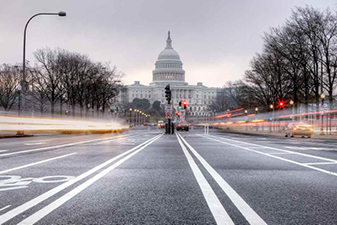|
By Cecile Entleitner, Associate, Blakey & Agnew
Over the past few months, COVID relief aid has been the top priority for the Biden-Harris Administration. When asked about an infrastructure bill and other important policy matters, officials mostly declined to share any specifics, stating instead that immediate COVID relief was the Administration's focus before moving on to other aspects of President Biden's plan to "Build Back Better." Now that Congress has completed this task, passing a $1.9 trillion funding package, many are wondering what's next.
Obtaining bipartisan support will be an important consideration for the next major policy proposal, particularly after the Biden-Harris Administration's first relief measure passed along party lines. In a recent interview, Secretary Buttigieg stated, "we've learned from the American Rescue Plan that something can be abundantly bipartisan in terms of support from Democrats and Republicans around America, and that's not always reflected on Capitol Hill." While infrastructure is often touted as one of the few issue areas for bipartisan consensus, this objective has proven to be challenging. Most lawmakers generally agree on the importance of transportation infrastructure and the need for federal investment, however, specific policies – including environmental provisions, funding sources, and permitting requirements – have been far more contentious.
Earlier this month, President Biden and Vice President Harris met with Secretary Buttigieg and House Transportation and Infrastructure (T&I) Committee leadership to discuss infrastructure legislation. The group agreed on the importance of taking a bipartisan approach to support economic growth and job creation through infrastructure investment in both urban and rural areas. T&I Ranking Member Graves (R-MO) reiterated Republicans' concerns and priorities for an infrastructure bill, stating that it "primarily focuses on fundamental transportation needs, such as roads and bridges. Republicans won't support another Green New Deal disguising itself as a transportation bill." Following the meeting, Chair DeFazio (D-OR) indicated he plans to advance a surface transportation reauthorization bill through the Committee this spring, noting the 2020 INVEST in America Act would be used as a starting point. The $500 billion legislation passed the House last year, despite strong Republican opposition regarding the bill's broad scope and extensive climate provisions, before stalling in the then-Republican controlled Senate.
Chair DeFazio also suggested the use of budget reconciliation to provide funding for an eventual bipartisan infrastructure bill. Budget reconciliation measures, such as the newly passed $1.9 trillion COVID package, are subject to many restrictions and limit provisions to those directly changing revenue, spending, or debt limits. Since reconciliation bills are exempt from the Senate filibuster and can therefore be passed by a simple majority, congressional Democrats could potentially use this procedure – even without Republican approval – to generate new revenue to fund an infrastructure bill.
Further changes to transportation spending could be on the horizon in the form of earmarks. House
|

Democrats recently announced plans to bring back the earmarking process after it was banned in 2011. House Appropriations Chair DeLauro (D-CT) issued proposed guidelines for earmark requests and distribution, now referred to as "Community Project Funding," for the fiscal year 2022 appropriations cycle. Community Project Funding would be limited to 1 percent of total discretionary spending and Members of Congress could submit a maximum of 10 requests. To increase transparency and accountability, lawmakers would be required to: publish their requests online; demonstrate community support for their requested projects; and certify that they, their spouse, and immediate family have no financial interest in the projects they request.
Chair DeFazio subsequently proposed a process for Members to submit highway and transit project designations for the upcoming reauthorization bill, stating that "the discretion to fund projects should not be reserved for State or Federal bureaucrats. Elected representatives know the infrastructure needs of their district and should be allowed to identify projects and advocate on behalf of their constituents in legislation." Among other requirements still to be determined, Member requests must identify whether the project is included on the State, Tribal, or territorial transportation improvement program (STIP) or metropolitan transportation improvement program (TIP), provide funding sources for the full share of the project's cost beyond the amount requested, and submit letters of support from the state or local project sponsor. The Committee also scheduled a Member Day hearing for April 14 to hear testimony on lawmakers' policy priorities.
Both the Appropriations and T&I Committee announcements indicated additional information would be provided in the coming weeks regarding which programs will be eligible for earmarking, criteria for consideration, and a formal process to submit project requests. However, even with this additional information the practical impacts of the new earmarking process may remain unclear. Republicans in both the House and Senate have internal conference rules in place banning the use of earmarks. House Republicans recently held a meeting to discuss whether their earmark ban should be lifted to take advantage of the project funding procedures and reportedly plan to vote on this decision soon. Moreover, the Senate has yet to announce its official participation or proposed process for earmarks, though Senate Appropriations Chair Leahy (D-VT) stated he engaged in "good faith negotiations with House and Senate colleagues to bring back congressionally directed spending in a transparent and responsible way, and those discussions are ongoing."
Blakey & Agnew, LLC is a public affairs and
communications consulting firm based in
Washington, DC.
|


